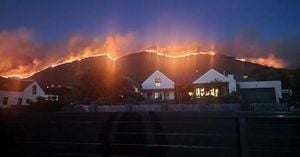A massive power outage struck the Iberian Peninsula at noon on April 28, 2025, affecting large areas of Spain and Portugal, with parts of France and the microstate of Andorra also experiencing outages. The blackout caused significant disruptions to transportation and daily life, leading to chaos at airports and train stations.
According to the Spanish railway company Renfe, the "entire national power grid" failed at 12:30 PM local time, halting all train services across the country. Passengers were left stranded, with eleven trains still immobilized with passengers onboard nearly ten hours after the outage. Spain's airport operator Aena reported incidents due to the blackout, activating emergency generators to manage the situation.
"We are experiencing critical hours until the power supply is restored," stated Spanish Prime Minister Pedro Sánchez during a televised address. He urged citizens to remain calm and limit phone use to essential communications to avoid overloading the networks. Sánchez emphasized that no hypotheses could be ruled out regarding the cause of the blackout, but he cautioned against speculation.
The blackout's impact was immediate and severe. Traffic lights across major cities failed, causing gridlock, and public transportation came to a standstill. Citizens in Madrid rejoiced when power was restored between 9:30 PM and 10:30 PM, with many celebrating the return of electricity and connectivity. "Siii!" and "Vivaaa!" echoed through the streets as lights flickered back on after more than nine hours of darkness.
By the evening, more than 35 percent of the electricity demand in Spain had been restored, according to the operator Red Eléctrica. The energy supply was gradually being restored in various regions, with power being sourced from both Spanish and French power plants. However, the complete restoration of the power grid could take between six and ten hours, as reported by Red Eléctrica.
In Portugal, the situation was similarly dire, with around 750,000 of 6.5 million connections re-established by the evening. However, the capital Lisbon remained without power for an extended period. The Portuguese operator REN indicated that substations in the northern city of Porto were back online, and they anticipated a return to normalcy soon.
The Bundesnetzagentur, Germany's federal network agency, reassured its citizens that a large-scale, long-lasting blackout like the one in Spain and Portugal was unlikely to occur in Germany. Klaus Müller, the agency's president, affirmed this during an evening news segment, stating, "A large-scale, long-lasting blackout is unlikely in Germany. We are well prepared." He explained that Germany's power grid is designed with redundancy, meaning that if one line fails, another can take over. Additionally, emergency-capable power plants are available to restore the grid if necessary.
Experts noted that the massive outage was unprecedented in modern energy markets. Paul Harreman, head of Energy Montel Analytics, explained that countries on the fringes of the European synchronous grid, like Spain, are more vulnerable to frequency deviations due to their isolation. He pointed out that Germany's extensive connections with other countries help stabilize its grid during crises.
In Spain, the three operational nuclear power plants were running on emergency power mode following the blackout. The Nuclear Safety Council reported that the reactors had been safely shut down according to protocol and were being powered by diesel generators. There were no adverse effects on plant staff, residents, or the environment.
As the situation unfolded, the Spanish government convened a crisis meeting to address the power failure and its aftermath. Authorities were in contact with the royal house, parliamentary factions, European partners, and NATO to ensure a coordinated response. Sánchez expressed gratitude to neighboring countries, including France and Morocco, for their assistance in restoring power.
Despite the chaos, some regions like the Canary and Balearic Islands were not affected by the blackout, providing a glimmer of normalcy amidst the turmoil on the mainland. However, the situation remained fluid, and the Spanish government urged citizens to stay informed through official channels.
As investigations into the cause of the blackout continued, initial reports suggested that a disturbance in a high-voltage line in France might have triggered the widespread outage. While no evidence of a cyberattack had been found, the national cybersecurity authority in Spain remained vigilant, monitoring for any potential threats.
The blackout highlighted the vulnerabilities in power infrastructure and the importance of preparedness in the face of such unprecedented events. While Spain and Portugal grappled with the immediate effects of the outage, Germany's proactive measures reassured its citizens that they were safeguarded against similar occurrences.
As the sun set on April 28, 2025, the people of Spain began to return to their routines, grateful for the restoration of power but aware of the fragility of their energy systems. The events of the day served as a stark reminder of the interconnectedness of modern infrastructure and the critical need for resilience in the face of unforeseen challenges.





